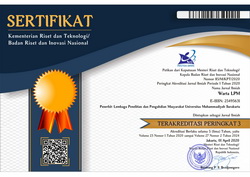Online Learning Content Creation for Junior High School Teachers during the Covid-19 Pandemic
DOI:
https://doi.org/10.23917/warta.v25i1.593Keywords:
online learning, content creation, covid-19Abstract
The community service program from Telkom University aims to improve the ability and insight of learning technology using Camtasia Studio at SMPN 1 Baleendah. The method used in community service is a form of training or workshops where the participants, in this case are teachers, are given training for a maximum of 3 hours, instructors in this case are from Telkom University. The stages carried out in this training are broadly as follows: The stages of making or recording material content, the editing or editing stages of material content and the stages of uploading learning material content. Participation by partners is in the form of providing space, infrastructure such as laptops or computers (computer laboratory recommendations), internet networks, and teachers’ resources to be given Camtasia Studio training. Based on the results of the initial survey it was found that 15% had experience in making interactive videos by using programs other than Camtasia studio, and as many as 85% of the teachers are inexperienced in making interactive videos because they only use learning media based on whatsapps, zoom and google classroom. After the training, there was an increase in the skill level of making interactive videos for all participants. As many as 75% of the teachers strongly agree regarding the suitability of the programs held with the aim of carrying out activities. Lecturers and students are stated to be more friendly, faster and responsive in helping during the practical activities of creating interactive video content using Camtasia studio.
Downloads
References
Adnan, M. (2020). Online learning amid the Covid-19 pandemic: Students perspectives. Journal of Pedagogical Research, 1(2), 45–51. https://doi.org/10.33902/jpsp.2020261309
Ali, W. (2020). Online and Remote Learning in Higher Education Institutes: A Necessity in light of Covid-19 Pandemic. Higher Education Studies, 10(3), 16. https://doi.org/10.5539/hes.v10n3p16
Baker, J. P., Goodboy, A. K., Bowman, N. D., & Wright, A. A. (2018). Does Teaching with PowerPoint Increase Students’ Learning? A Meta-Analysis. Computers and Education, 126, 376–387. https://doi.org/10.1016/j.compedu.2018.08.003
Bhaumik, M., Hassan, A., & Haq, S. (2020). Covid-19 Pandemic, Outbreak Educational Sector and Students Online Learning in Saudi Arabia. Journal of Entrepreneurship Education, 23(3), 23.
Brophy, J. (2010). Motivating Students to Learn (3th Ed). Routledge, Abingdon-on-Thames.
Chauhan, S. (2017). A Meta-Analysis of the Impact of Technology on Learning Effectiveness of Elementary Students. Computers and Education, 10(5), 14–30. https://doi.org/10.1016/j.compedu.2016.11.005
Churiyah, M., Sholikhan, S., Filianti, F., & Sakdiyyah, D. A. (2020). Indonesia Education Readiness Conducting Distance Learning in Covid-19 Pandemic Situation. International Journal of Multicultural and Multireligious Understanding, 7(6), 491. https://doi.org/10.18415/ijmmu.v7i6.1833
Clark, A. E., Nong, H., Zhu, H., & Zhu, R. (2020). Compensating for Academic Loss: Online Learning and Student Performance During the Covid-19 Pandemic. Journal of Education, 1(2), 1–18. https://halshs.archives-ouvertes.fr/halshs-02901505
Dhawan, S. (2020). Online Learning: A Panacea in the Time of Covid-19 Crisis. Journal of Educational Technology Systems, 49(1), 5–22. https://doi.org/10.1177/0047239520934018
Dhull, I., & Sakshi. (2017). Online Learning. International Education & Research Journal (IERJ), 3(8), 32–34.
Febrianto, P. T., Mas’udah, S., & Megasari, L. A. (2020). Implementation of Online Learning During the Covid-19 Pandemic on Madura Island, Indonesia. International Journal of Learning, Teaching and Educational Research, 19(8), 233–254. https://doi.org/10.26803/ijlter.19.8.13
Giatman, M., Siswati, S., & Basri, I. Y. (2020). Online Learning Quality Control in the Pandemic Covid-19 Era in Indonesia. Journal of Nonformal Education, 6(2), 168–175. https://journal.unnes.ac.id/nju/index.php/jne
Hamid, R., Sentryo, I., & Hasan, S. (2020). Online Learning and Its Problems in the Covid-19 Emergency Period. Jurnal Prima Edukasia, 8(1), 86–95. http://journal.uny.ac.id/index.php/jpe
Kaiser, G., & König, J. (2019). Competence Measurement in (Mathematics) Teacher Education and Beyond: Implications for Policy. Higher Education Policy, 32(4), 597–615. https://doi.org/10.1057/s41307-019-00139-z
Kamal, A. A., Shaipullah, N. M., Truna, L., Sabri, M., & Junaini, S. N. (2020). Transitioning to Online Learning During Covid-19 Pandemic: Case Study of A Pre-University Centre in Malaysia. International Journal of Advanced Computer Science and Applications, 11(6), 217–223. https://doi.org/10.14569/IJACSA.2020.0110628
Keller, J. M. (2010). Motivational Design for Learning and Performance: The ARCS Model Approach. Spinger.
König, J., Jäger-Biela, D. J., & Glutsch, N. (2020). Adapting to Online Teaching During Covid-19 School Closure: Teacher Education and Teacher Competence Effects Among Early Career Teachers in Germany. European Journal of Teacher Education, 43(4), 608–622. https://doi.org/10.1080/02619768.2020.1809650
Lee, J., & Martin, L. (2017). Investigating Students’ Perceptions of Motivating Factors of Online Class Discussions. International Review of Research in Open and Distance Learning, 18(5), 148–172. https://doi.org/10.19173/irrodl.v18i5.2883
Lestiyanawati, R., & Widyantoro, A. (2020). Strategies and Problems Faced by Indonesian Teachers in Conducting E- Learning System During Covid-19 Outbreak. Journal of Culture, Literature, Linguistic and English Teaching, 2(1), 71–82.
Mahmood, S. (2020). Instructional Strategies for Online Teaching in Covid-19 Pandemic. Human Behavior and Emerging Technologies, July, 1–5. https://doi.org/10.1002/hbe2.218
Mishra, L., Gupta, T., & Shree, A. (2020). Online Teaching-Learning in Higher Education During Lockdown Period of Covid-19 Pandemic. International Journal of Educational Research Open, 100012. https://doi.org/10.1016/j.ijedro.2020.100012
Nakayama, M., Mutsuura, K., & Yamamoto, H. (2014). Impact of Learner’s Characteristics and Learning Behaviour on Learning Performance during a Fully Online Course. Electronic Journal of E-Learning, 12(4), 394–408. www.ejel.org.
Olszewska, K. (2020). The Effectiveness of Online Learning in the Era of the SARS-CoV-2 Pandemic on the Example of Students of Polish universities. World Scientific News, 148(August), 108–121.
Post, T. J. (2020). Covid-19 Figures Keep Getting Worse, Says President National The Jakarta Post. the Jakarta Post. https://www.thejakartapost.com/news/2020/11/30/covid-19-figures-keep-getting-worse-says-president.html
Qazi, A., Naseer, K., Qazi, J., AlSalman, H., Naseem, U., Yang, S., Hardaker, G., & Gumaei, A. (2020). Conventional to Online Education During Covid-19 Pandemic: Do Develop and Underdeveloped Nations Cope Alike. Children and Youth Services Review, 119, 105582. https://doi.org/10.1016/j.childyouth.2020.105582
Sahu, P. (2020). Closure of Universities Due to Coronavirus Disease 2019 (Covid-19): Impact on Education and Mental Health of Students and Academic Staff. Cureus, 2019(April). https://doi.org/10.7759/cureus.7541
Samir Abou El-Seoud, M., Taj-Eddin, I. A. T. F., Seddiek, N., El-Khouly, M. M., & Nosseir, A. (2014). E-learning and Students’ Motivation: A Research Study on the Effect of Elearning on Higher Education. International Journal of Emerging Technologies in Learning, 9(4), 20–26. https://doi.org/10.3991/ijet.v9i4.3465
Schunk, D. H., Meece, J. R., & Pintrich, P. R. (2014). Motivation in Education: Theory, Research, and Applications (4th Ed). Pearson.
Schunk, D. H., & Usher, E. L. (2012). Social Cognitive Theory and Motivation The Oxford handbook of Human Motivation (In RM Ryan). Oxford University Press.
Setiawan, B., & Iasha, V. (2020). Covid-19 Pandemic: the Influence of Full-Online Learning for Elementary School in Rural Areas. Jpsd, 6(2), 114–123.
Sintema, E. J. (2020). Effect of Covid-19 on the Performance of Grade 12 Students: Implications for STEM Education. Eurasia Journal of Mathematics, Science and Technology Education, 16(7), 1–6. https://doi.org/10.29333/ejmste/7893
Wargadinata, W., Maimunah, I., Dewi, E., & Rofiq, Z. (2020). Student’s Responses on Learning in the Early COVID-19 Pandemic. Tadris: Jurnal Keguruan Dan Ilmu Tarbiyah, 5(1), 141–153. https://doi.org/10.24042/tadris.v5i1.6153
Yulia, H. (2020). Online Learning to Prevent the Spread of Pandemic Corona Virus in Indonesia. ETERNAL (English Teaching Journal), 11(1), 48–56. https://doi.org/10.26877/eternal.v11i1.6068
Downloads
Submitted
Published
How to Cite
Issue
Section
License
Copyright (c) 2022 Warta LPM

This work is licensed under a Creative Commons Attribution 4.0 International License.















